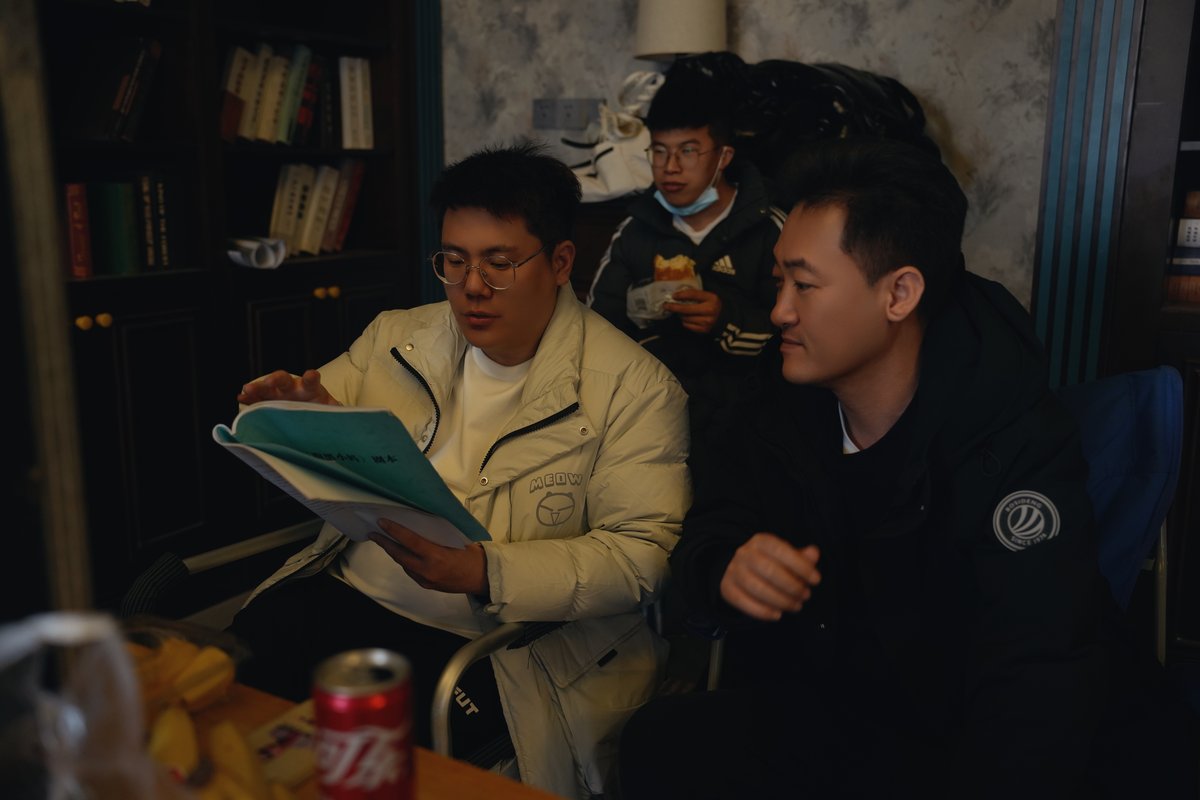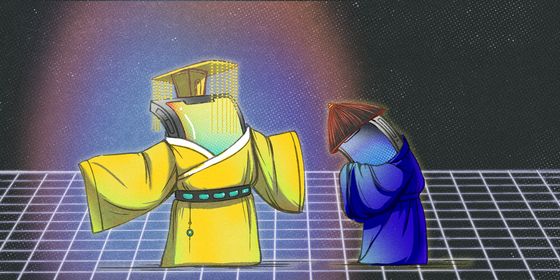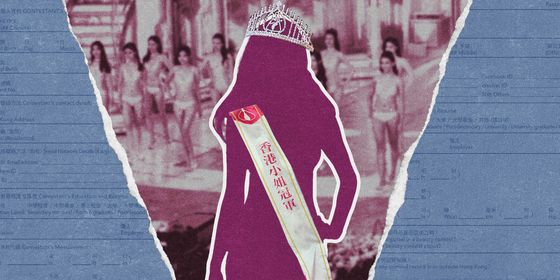Insider anxiety, regulatory scrutiny, and widespread criticism challenge the micro-drama industry in sustaining its billion-dollar saga
Chi Zican, a 20-year-old scriptwriting major from Zhejiang province, quickly realized he had to forget everything he had learned in college for his first writing gig. His debut script tells the story of a woman who time-travels to uncover the mystery behind her daughter’s death. But while Chi had learned how to write for traditional TV shows at university, this script was for a micro-drama to be shot vertically in minutes-long episodes—a format that’s swept China’s entertainment industry.
“Traditional scripts demand depth, character development, and logical plot progression. For example, it’s crucial to understand why the main character builds emotional connections. However, in micro-dramas, you don’t need to explain why a rich guy falls for a poor girl; you don’t need to consider the rationality behind it. It’s just about juicy plot points,” says Chi, who was offered an industry standard flat salary of around 10,000 yuan for his debut script spanning 100 one-minute-long episodes.
Chi is one of many aspiring writers, actors, and producers jumping on the bandwagon of the burgeoning Chinese micro-drama industry that offers newcomers opportunities to break into a once highly exclusive field. But despite an exploding market, the makers of these shows face regular overtime, professional stigma, and even financial losses in an industry increasingly under official scrutiny for its content.
Unlike traditional TV programs, micro-dramas are often watched via short video platforms like Douyin (China’s version of TikTok). Many scripts draw inspiration from popular Chinese online literature, featuring fast-moving plots following rags-to-riches tales, love triangles in billionaire families, time travel adventures, and vendettas. The first 10 episodes are often free to watch, with each episode ending with a cliffhanger, compelling users to spend about 30 yuan to watch the remaining episodes ad-free. Individual episodes can be purchased for about 1 yuan each.
These productions, often made for less than 100,000 yuan, have become a billion-dollar industry. According to business observation platform Qujieshangye, in 2023, the short video platform Kuaishou alone had approximately 270 million daily active users for micro-dramas, with over 94 million being paid users, marking a year-on-year increase of over 52 percent. The number of micro-drama channels on the platform also exceeded 100,000.
But despite the booming market, these productions also triggered controversies among consumers for their cliché storylines and low-quality content. A survey by the China Youth Daily Survey Center last December found that half of 1,129 participants thought the main problem with micro-dramas is their rough production quality and similarity in storylines and characters. Over 17 percent believed that the content was unsuitable for teenage viewers.
For actors, this perceived poor quality affects their reputations. In 2022, Beijing-based producer Li Yunming received a call from an actor who wanted to use a fake name in the credits of Li’s film to avoid negatively impacting his career, he tells TWOC.
“Some advertising companies even told us they didn’t want actors involved in the micro-drama industry to shoot their commercials,” says Zhang Yaya, an actor in her 20s from Hangzhou, Zhejiang province. Zhang, who asked to use a pseudonym for this piece, believes this is because “they thought the micro-drama industry is all about vulgar and sexual content.”
However, when the industry boomed in the last couple of years, “Many advertisement actors I knew transitioned into the industry for opportunities and money,” says Zhang.
In a role last August, Zhang portrayed a diligent, top-of-the-class high school student from a poor family whose identity is thrown into disarray when a rich transfer student starts competing with her. Zhang earned less than 1,000 yuan for nine hours of work. However, as her previous regular gigs often meant under one minute of screen time in advertisements, micro-dramas have helped Zhang pursue her acting dreams. Furthermore, top micro-drama actors can make about 10,000 yuan a day, “double what I earned in advertising,” Zhang tells TWOC.
Apart from professional stigma, insiders also face the risk of exploitation due to small budgets and tight schedules. Companies often produce an entire micro-drama in just seven days, leaving employees susceptible to overwork. A report by Time News magazine this February noted that one extra in Hengdian, China’s largest film studio located in Zhejiang province, had appeared in over 100 micro-dramas within six months. Some extras even reported sleeping less than four hours a day during peak filming times.
Li Dongdong, the 34-year-old founder of a Guangxi company specializing in micro-dramas, decided to transition from making films to producing two-minute-long shows in 2016, but it wasn’t until 2020 that investors were willing to put money into her projects. She received 20,000 yuan to produce 100 episodes, each one minute long, about the romantic adventures of a divine doctor. To keep costs low, Li worked with a crew of just 10 people for three consecutive days and nights, filming using cell phones and simple tripods.
At least the series was a hit. With 10 episodes released free and audiences charged 199 yuan for the remaining 90 episodes, it made about 3 million yuan for streaming platforms. “Though it was a lot of hard work, I still feel quite accomplished,” she says about the experience.
Huang Bingshen, a 28-year-old video editor from Guangxi, regularly works 17-hour days, editing as many as 10 episodes every three days to meet production schedules. “If the producer feels [the footage] doesn’t meet expectations, then they will rely on the editing to make improvements,” says Huang. Sometimes producers ask for subsequent episodes of a series to be edited according to viewer feedback on previous videos, further tightening Huang’s deadlines.
In the ultrashort format, editors must focus on grabbing viewers’ attention. “In just one minute, there need to be about seven plot twists...while in a traditional drama of 20 minutes, there are perhaps just three twists,” Huang tells TWOC, emphasizing the need for changes in background music, footage, rhythm, and sound effects to evoke audiences’ emotions. Huang has also discovered that many actors in micro-dramas lack professional training, and some even lack Mandarin fluency, requiring dubbing from professional voice actors.
The industry has recently come under regulatory scrutiny due to the controversial plotlines featured in many productions. Last November, the micro-drama hit Rise of the Dark Lotus, which raked in over 20 million yuan in subscription fees within 24 hours of release, was removed from short video platforms including WeChat, Kuaishou, and Douyin for its themes of revenge and violence, the platforms announced on November 21.
The same month, the National Radio and Television Administration implemented a one-month crackdown on pornographic, violent, and obscene content in micro-dramas on short video platforms—over 2,000 micro-dramas were targeted in that wave of removals. Major short video platforms including WeChat, Kuaishou, and Douyin have blacklisted certain accounts producing dramas that violate these platforms’ terms of service.
Huang encountered some morally ambiguous storylines while working on a project last December. “The father slept with his wife’s younger sister, who later slept with her nephew, the older brother of the female protagonist. The narratives involved taboo relationships, infidelity, and disturbing acts like abduction and rape,” says Huang. “I don’t know...how it passed the approval process. It seems the content doesn’t matter; [creators] just try to be as messy as possible.”
Beijing-based producer Li Yunming feels the industry is still chaotic despite the recent regulatory crackdown. “One could be an extra yesterday, a coordinator today, and a producer or a director tomorrow. It’s just because of the low cost: no matter how little money you have, anyone can do it. It doesn’t need specialized expertise or techniques like lighting and photography; everyone can shoot a short TV drama,” says Li Yunming.
Now, however, many commentators warn that the domestic micro-drama market is approaching saturation. Some investors are struggling to break even. Jiuzhou Culture, one of China’s top micro-drama companies, released data last November that showed around 30 percent of their 50 to 60 micro-drama shows each month weren’t profitable. Most of Li Yunming’s shows have a budget under 100,000 yuan, while he claims about 80 percent of the revenue they generate is funneled into marketing on short video platforms. One micro-drama about a millionaire’s love story Li Yunming worked on grossed over 16 million yuan but cost 10 million yuan in advertising.
Li Yunming believes the streaming platforms, rather than creators, make most of the profits from the micro-drama boom. “Generally speaking, production companies don’t make much money because the budget provided by the platform for each show is very low. For companies that fund their own productions, they don’t make any money either because the revenue they receive can’t even cover the costs,” he says.
Li Dongdong’s recent production, a micro-drama series about time-traveling lovers, made a loss. Li Dongdong had received an unusually high 1 million yuan investment for the show, worked with a large crew of 20, and tried to use high-quality costumes. In the face of diminishing profits and stricter regulations, she has since shifted her company’s focus to producing scripts to sell to other producers for 5,000 yuan each.
“Once you start aiming for ‘high-quality production,’ you raise the production threshold. In the end, that may not turn out very profitable,” says Li Yunming. The raw, low-budget look and feel of micro-dramas may ultimately be what attracts viewers, he speculates.

















